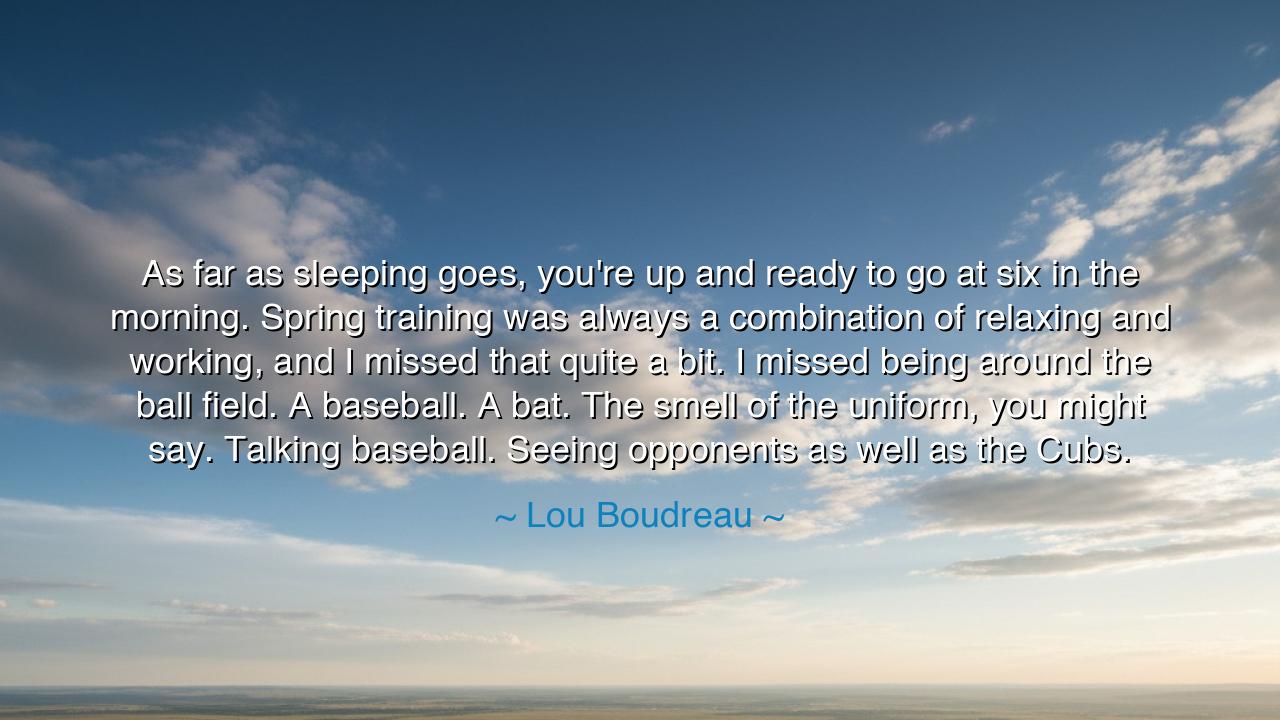
As far as sleeping goes, you're up and ready to go at six in the
As far as sleeping goes, you're up and ready to go at six in the morning. Spring training was always a combination of relaxing and working, and I missed that quite a bit. I missed being around the ball field. A baseball. A bat. The smell of the uniform, you might say. Talking baseball. Seeing opponents as well as the Cubs.






“As far as sleeping goes, you’re up and ready to go at six in the morning. Spring training was always a combination of relaxing and working, and I missed that quite a bit. I missed being around the ball field. A baseball. A bat. The smell of the uniform, you might say. Talking baseball. Seeing opponents as well as the Cubs.” Thus spoke Lou Boudreau, the Hall of Fame shortstop and manager, whose life was bound to the game he loved. His words are more than nostalgia; they are a hymn to discipline, routine, and the fellowship of a calling. For in the rhythm of waking early, in the sacred rites of spring training, and in the simple presence of bat and ball, he found meaning, joy, and purpose.
The origin of this saying rests in the life of a man who knew both the glory and the grind of baseball. Lou Boudreau, who played through the 1940s and later managed, understood that the game was not only played under the lights of great stadiums but also in the quiet discipline of mornings at spring training. Rising at six was not a burden—it was a ritual, a signal that one belonged to something greater than oneself. To be part of the team was to breathe in the smell of the uniform, to hear the crack of the bat, to share jokes with friends and face opponents with respect. His longing was not for fame, but for the fellowship of the field.
The ancients would have recognized this spirit well. The Roman legions, before battle, drilled at dawn, their lives built upon routine and camaraderie. It was not only their armor that kept them strong, but the brotherhood of men rising together to work and train. So too the disciples of a craft—be it philosophy in the gardens of Athens or swordsmanship in the dojos of Japan—knew that meaning was not found only in achievement but in practice, preparation, and community. Boudreau’s words are echoes of this same wisdom, showing us that the ball field, like the training ground of old, was a place where men were shaped.
History gives us another parallel in the story of Jesse Owens, who trained tirelessly before his triumph at the 1936 Berlin Olympics. His glory was not simply in the races he won before the eyes of the world, but in the countless unseen mornings of training, of rising early, of enduring monotony and fatigue. The fellowship of teammates, the rhythm of preparation, the smell of the track—all of these wove the fabric of his greatness. Boudreau, in his own way, speaks of this same truth: the greatness of sport is born not in the roar of the crowd, but in the quiet love of practice and presence.
From this, we learn that what we miss most in life is often not the moments of victory, but the daily rituals that gave us purpose. Boudreau did not dwell on championships or accolades—he missed the smell of the uniform, the chatter of teammates, the routine of rising with the sun. It is the simple things, repeated faithfully, that anchor the human soul. When they are gone, their absence weighs heavily. Thus, his words remind us to cherish the ordinary while we have it, for it is the ordinary that makes the extraordinary possible.
Practical wisdom follows: in your own life, seek out and treasure the rituals that give meaning to your days. Rise early with purpose, dedicate yourself to both work and relaxation, and honor the fellowship of those who walk beside you in your chosen field. Do not take for granted the simple tools of your craft—the pen, the desk, the instruments of labor—for one day you may find yourself missing their very presence. Recognize that greatness is not only in the outcome but in the journey of daily devotion.
Thus, let Lou Boudreau’s words echo as a teaching: “A baseball. A bat. The smell of the uniform.” In them lies the essence of belonging, the joy of discipline, and the sweetness of memory. May we learn from him that life’s true treasures are found not only in victory, but in the mornings of training, the fellowship of comrades, and the love of the game itself—whatever our “game” may be. For those who embrace these daily gifts will carry with them a legacy that outlasts applause, a legacy rooted in devotion, purpose, and the eternal rhythm of rising each morning ready to serve their calling.






AAdministratorAdministrator
Welcome, honored guests. Please leave a comment, we will respond soon